1962: An MP on trial, the Solicitor-General his Defence Counsel and Macmillan’s timely Night of the Long Knives (13th July)
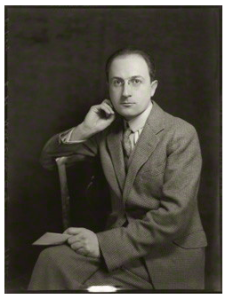
Horobin in 1934, National Portrait Gallery, http://www.npg.org.uk/collections/search/portrait/mw120053/Sir-Ian-Macdonald-HorobinA fly in the reshuffle
Sir Ian Horobin MP, Laurens Van Der Post Will Black’s recent article for his Huffington Post blog here asks whether Cameron’s cabinet reshuffle wasn’t more window dressing designed to distract from the ongoing pressure on the Palace of Westminster to take itself seriously as just another institution under investigation for child abuse allegations? 52 years earlier on the same date, 13th July, Harold Macmillan, Conservative Prime Minister, culled one third of his Cabinet. Remarkably, at the time of the reshuffle, a resolutely unremorseful Sir Ian Horobin MP (Con. Oldham East) was due to stand trial five days later for a number of indecent assaults on teenage boys during 1958-1961 as reported in The Times on 16 May 1962. Horobin, aged 31 had briefly been Conservative MP for Southwark for a term between the wars (1931 – 1934) and didn’t return to politics until 6 years after the war in 1951 as MP for greater Manchester constituency Oldham East. We get a taste for Horobin’s enthusiasm in a letter to the Editor of The Times written 10 years before his conviction: 
“May I intervene in the correspondence about research into youth work? My only qualification is 30 years’ slogging hard work in one small corner of that field. I do so to say heaven preserve us from any more inquiries…”
Somewhat ironic in the context of Theresa May’s recent capitulation to calls for an overarching inquiry. Three years after this letter Horobin received a knighthood for his good works with East End boys. Five days after the reshuffle, on 17 July 1962 Sir Ian Horobin pleaded guilty to a number of indecent assaults on boys at the Fairbairn Boys’ Club in Plaistow. Here he had lived in a bedsit above the dining room on the premises, despite being an MP in a Greater Manchester constituency for ten years. Someone who did rather well out of Macmillan’s reshuffle was Peter Rawlinson, a QC and Conservative MP for Epsom in Surrey, and at the time engaged as Horobin’s defence counsel, against Mervyn Griffiths for the Crown.
Sir Peter Rawlinson (Solicitor General under Macmillan 1962-1964; Attorney General under Ted Heath 1970-74; Attorney General for Northern Ireland 1972-1974) 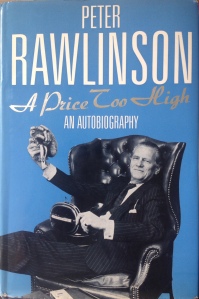
In his autobiography, A price too high, published in 1989, Rawlinson’s Prologue details how the day before Horobin was due in court to, Rawlinson was summoned by Macmillan to be offered the position of Solicitor General. Rawlinson asks 48 hours grace to undertake an ‘unusually distasteful’ task of completing Horobin’s defence. Supermac, appearing to have forgotten any headlines reporting the case, asks why Horobin hadn’t the decency to do a runner like Willie Beauchamp, presumably referring to William Lygone, 7th Earl of Beauchamp, former leader of the Liberals in the House of Lords and Governor General of New South Wales (supposedly the model for Lord Marchmain in Evelyn Waugh’s Brideshead Revisited).
“The following day I performed my ‘unusually distasteful’, and extremely difficult, task. My client had at one time wanted me in my speech in mitigation of his offences to impress upon the judge that in the East, when a city had been stormed and sacked, it was not only the girls who were raped. Then he wanted me to say that often the boys he had seduced in their youth had later brought their own sons to join the club, so where was the harm? Again I suggested that this line might not altogether appeal to the sentencing judge. In the event the trial lasted only a few hours. Sir Ian pleaded guilty and was sentenced, as he had been warned, to a substantial term of imprisonment.” (A Price Too High, Peter Rawlinson, p.5)
“A 15-year old boy told the court that after he joined the boys’ club at the age of 11, Sir Ian asked if he collected foreign stamps and invited him to his room to get some.
While there, the boy added, Sir Ian committed an offence. He was given his stamps and afterwards he attended chapel – and so did Sir Ian.” [Daily Mirror, 4 June 1962]
Horobin was sentenced to four years in prison and moved to Tangiers on his release, where boys were in more plentiful supply with less fear of criminal repercussions.
‘He referred to homosexuals as “us poor devils who are born like this; nothing can change me. It is natural for some people to love boys in this way.” Subsequently at a party Horobin said the touch of a woman sickened him and the law on homosexuality was silly.’
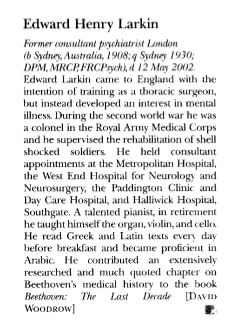
Obituary of Edward Larkin – Woodrow, David. British Medical Journal, International edition325.7371 (Nov 2, 2002): 1041
A War Hero, Fallen…
In 1923, having already fought in the Great War serving in the RNVR and at the youthful age of 24, Horobin had become Warden of Mansfield House University Settlement including Fairbairn Hall, Plaistow in East London. His father had been Principal of Homerton College, Cambridge. Here at No. 310, Barking Road not too far from the Mile End Road’s Regal Billiard Hall in Eric Road where by the mid-fifties a twenty year old Ronnie Kray was also admiring the view of boys taking their shots at the snooker tables, Horobin could be found patting boys on the rear as they took their shot,
“Fairbairn Boys Club was founded in the late 1800’s by Lady Trowe in the Leas Hall, Canning Town, for the underpriviledged children of the East End. Fairbairn is actually a Scottish word meaning ‘good child’. The Club moved to Fairbairn hall in Barking Road, Plaistow in 1923 where it flourished in all sports including Boxing, Rugby, Cricket and Football. Famous sports personalities to emerge through the Club are Billy Walker, Terry Spinks, Graham Gooch, Alan Sealey and Alan Curbishley …” http://www.londonaba.co.uk/clubs/North-East/Fairbairn-ABC
“Decline followed the First World War of 1914-18. In1920 residents returned to Mansfield House. 1921 saw the setting up of teacher training courses. In 1923 the Men’s club premises were sold. However Ian (later Sir Ian) Horobin, honorary warden 1923-61 revived and expanded the local work. In 1926 the Lady Trower Trust was formed to administer East Ham playing fields (between present day Burgess Road and the A40) and camp-sites at Lambourne End and Sandwich. 1928, and social work training courses were set up; 1931 Fairbairn Hall was re-designed and extended and opened by Duke and Duchess of York (later King George V1 and Queen Elizabeth); 1935: new residences built in Avenons Road; 1938: chapel added with 100 Anglican and Non-Conformist ordination candidates a year. By 1938 Fairbairn Boys and Men’s Clubs had a membership of 5000.”
http://www.newhamstory.com/node/2584 “Fairbairn House, originally opened in 1900, was greatly enlarged during the 1930s incorporating a beautiful Art Deco interior designed by the architect Grey Wornum, who was also responsible for the interiors of the Cunard ocean liner Queen Elizabeth. New sports facilities at Burges Road, in East Ham (1925), and a sixty acre farm on the outskirts of London at Lambourne End (1935) – used for camping and other outdoor activities – were presented to the Settlement by the Lady Trower Trust.” http://www.aston-mansfield.org.uk/about/our-history/
As Matthew Parris and Kevin Maguire also point out, it was for Horobin’s charitable work in the East End, including prodigious fund-raising, Macmillan was to offer him a peerage in 1962.
“In 1923 he had practically re-founded the Mansfield House University Settlement, a young men’s and boy’s club, raising over half a million pounds for its upkeep. He was its warden, living in a small bedsit above the dining room.” (Great Parliamentary Scandals, 2004 edition, p.144 below)
So far, so very Smith & Savile…like Smith’s control over Knowl View in Rochdale, trumpeting his own ‘social work’ skills and sacrifices in letters to Social Work Today and Savile’s propensity to secure himself living quarters at various institutions across the British Isles and raise vast sums of money, Horobin’s charitable and philanthropic front also gave him access and opportunity to abuse. Parris and Maguire relay Terence Stamp’s memories of Horobin from his autobiography:
“After boxing bouts the boys would occasionally find Horobin supervising proceedings in the communal bath area, perched on a shooting stick. They called him ‘Spike’. One old boy, the actor Terence Stamp, recalls how ‘there was all kinds of gossip about Sir Ian, the strongest being that he was a bit of a “ginger beer”.’ Despite the rumours, Stamp’s autobiography describes how, aged fourteen, he was ‘chuffed’ to receive an invitation to Horobin’s flat one Saturday afternoon to show off some paintings he had entered in a competition.” (Great Parliamentary Scandals, p.144)
The facilities were a vast draw to the 1950s East-End/Essex teenaged boy and many a friendship and sporting careers were begun at Fairbairn House. Billy Walker, an amateur boxer while working as a doorman for Savile at the Ilford Palais, aged 16, trained at Fairbairn Amateur Boxing Club on Barking Road
“The Second World War of 1939-45 brought disruption. Post war developments saw Joan Littlewoods’ Acting School accommodated (1961). By 1962 membership had dropped to one third after Ian Horobins’ departure.” http://www.newhamstory.com/node/2584
Perhaps coincidentally it was through Joan Littlewood that Tom Driberg MP would come to know the Krays who were part of the milieu celebrating ‘Sparrers can’t Sing’ although already wary of being seen with the Krays: “Tom Driberg didn’t turn up. He’d already been photographed with the Krays and didn’t like it.” It was during Joan Littlewood’s use of Horobin’s Fairbairn facilities, also used by The Mansfield Players, that reports of Horobin’s behaviour with boys had finally been reported to the Deputy Warden in 1961.
“Ian Horobin (1899 – 1976), a war hero who had shown exemplary courage as a prisoner of the Japanese, sat as Conservative MP for Oldham East from 1951 to 1959, serving as Parliamentary Secretary to the Minister of Power during his last year in the House of Commons. In 1962 Macmillan recommended him for a life peerage, and his elevation had been gazetted when Horobin suddenly withdrew his acceptance of it owing to the fact that, in the interim, he had been charged with indecent assault. For almost forty years, he had served as Warden of Mansfield House University Settlement, a club for boys and young men in the East End, where he lived in a small flat: his work there was recognised with a knighthood in 1955, but his homosexual tastes were common knowledge among the boys, who were well rewarded if they agreed to satisfy his fairly innocent desires, and with some of whom he formed affectionate relationships. However, in 1961 his activities were denounced to the authorities by a clergyman, and after a trial at which he was defended by a former parliamentary colleague, the future Attorney-General Peter Rawlinson QC, he was sent to prison for four years. Horobin, who spent his last years in Tangier, remained unrepentant about his way of life, telling his friend the poet John Betjeman” “I broke the law with my eyes open all my life until I went to prison. I broke it in prison. I broke it immediately I came out of prison, and I have not the slightest intention of ever paying any attention to it.’
[Closet Queens, Michael Bloch, 2015 Loc 2886/5565]
10 shillings in today’s money is just under £10; £2 in 1962 is worth just under £40 today.
I can’t really work out why there’s still such an indulgent attitude to this very day regarding Sir Ian Horobin’s abuse of underage boys, or why he is considered to be gay when his sexual preferences were quite clearly for boys under the age of 16 and his development of Fairbairn Hall was driven by the same desires as Sir Cyril Smith – to provide him with a selection of children from which to choose. Perhaps Parris, Maguire and Bloch have either not read the newspaper reports of his offences at the time (or Rawlinson’s autobiography) or they have done their research and instead wish to gloss over sexual assaults of 11 year olds as if they’re a quaint peccadillo and synonymous with being gay which sadly is exactly the kind of conflation PIE and PIE’s Peter Righton capitalised on.
Enter Horobin’s faithful defender: Laurens Van Der Post…Another Knight with a tarnished reputation (The Oxford Times, 18/10/2012, Chris Gray)
In his early forties by the time the Second World War broke out, Horobin served in the RAF as a squadron leader and became a Japanese Prisoner of War with Laurens Van Der Post in Soekaboemi in Java. Van Der Post who died in December 1996 became spiritual guru to first the Prince of Wales during the 70s through his wife Ingaret becoming Charles’ Jungian psychoanlsyst , and then as an informal adviser to Margaret Thatcher, his Chelsea neighbour, during the Falklands War. Van Der Post considered he owed his life to Horobin (The night of the new moon, 1970) and wrote in 1989 to the Times saying:
” Ian Horobin , a minister-to-be in Macmillan’s government, frail and badly tortured at the outset, was one of the few I could trust with the knowledge of our secret radio. He came to me the day after the news of Hiroshima to say: “At prayers this morning I watched our hosts as usual bowing to the rising sun. Poor devils. Bloody poor devils!” and he burst into tears.”
Prior to the WWII Laurens Van Der Post had come to Britain from South Africa, the Woolfs publishing his first book In a Province (1934) via William Plomer’s contacts and having struck up a relationship with the Queen Mum’s poetry writing cousin Lilian Bowes-Lyon, he settled his wife and son in a farm in Tetbury for a bit before sending them back to South Africa during the war where he didn’t see them for ten years. Following the War, he claimed to have become an aide to Lord Mountbatten in Indonesia where his Dutch language skills were in demand.
Five years following the war saw Lord Reith (the first and former head of the BBC in the 1920s recently noted for his interest in a 14 year old boys and a 12 year old girl) as head of the Colonial Development Centre asking Van Der Post to investigate the Kalahari Bushmen and during the 1950s Van Der Post’s reputation as an ‘explorer’ became settled. In 1982 Laurens Van Der Post’s position as a close friend of Prince Charles was cemented when he was appointed as godfather to Prince William at the same time he was bending Thatcher’s grateful ear on the Falklands. In 1983 two books of his, The Seed and the Sower (1963) and The Night of the New Moon (1970) were to form the basis of the 1983 film Merry Christmas Mr Lawrence starring David Bowie. However, in the early 1950s, while his friend Horobin was preying on teen boys, Van De Post was also known to have impregnated a 14 year old daughter of a family friend he’d been entrusted to look after on a sea voyage when he was 46, just before his second marriage to Jungian analyst, Ingaret. Apparently he sent money although never properly acknowledging the daughter he’d left the child with or how she’d had to return home alone from her place at the Royal Ballet School, a fact confirmed by one of Van Der Post’s daughters 11 years ago, Lucia – now a Times beauty and luxe spending journalist:
“As for Mr. Jones’s allegations about her father’s relationship with a 14-year-old girl, ”I’m afraid I think that’s true,” Ms. Crichton-Miller said. ”He was not a saint. He hurt people. He hurt me. But by God, he was fascinating.” Master StoryTeller or Master Deceiver, New York Times, 03/08/2003
“In the 1970’s van der Post met Prince Charles through mutual friends. In 1987 he took Charles on a four-day trip to the Kalahari, telling the prince, ”This is the real Africa.” Mr. Jones states that sometime in the mid-70’s, Charles began having psychoanalytic treatment with Ingaret, who was a Jungian analyst, and then with van der Post’s friend Dr. Alan McGlashan. Diana, Princess of Wales, was also treated by Dr. McGlashan during the troubles in her marriage, Mr. Jones writes. Christian Science Monitor Charles told van der Post his dreams, and van der Post drafted some of his speeches. When van der Post died, Charles set up an annual lecture in his honor. But van der Post’s most significant influence occurred during the South African struggle over apartheid, Mr. Jones says. Van der Post hated Nelson Mandela and championed the Zulu chief Mangosuthu Buthelezi, whom he saw as a foil for the African National Congress’s Communist beliefs. He arranged meetings between Chief Buthelezi, Charles and Mrs. Thatcher. Mr. Jones argues that van der Post had helped convince Mrs. Thatcher to oppose sanctions against the South African government and not to embrace Mr. Mandela. As van der Post lay dying, Mr. Jones says, Charles visited him. At his memorial service, Lady Thatcher read the lesson and Chief Buthelezi spoke. Nonetheless, Mr. Jones writes, there were apparently some who doubted van der Post even when he was alive. Mr. Jones says that when a doctor who knew him was asked the cause of his death, the doctor replied, ”He was weary of sustaining so many lies.”
Supermac: From one scandal to another to another to resignation
In 1958 Macmillan had raised one ‘rogue’ to the House of Lords, his nemesis in love, Lord Bob Boothby who was having an affair with his wife Lady Dorothy Cavendish. On 22 August 1958, 4 years earlier, Macmillan had already offered Boothby a peerage under pressure of Boothby’s continued affair with his wife Dorothy. Lord Robert or ‘Bob’ Boothby was a cad (not a bounder as the Queen Mother would have it apparently). Within 6 years Boothby was to feature in the headline the Peer and the Gangster, see John Pearson’s article in The Sunday Independent (15th June 1996) for further details. In the meantime Macmillan’s position became increasingly unstable under the pressure of other burgeoning scandals. In December 1961 Mariella Novotny was holding her ‘sexy parties’ at 13, Hyde Park Square to which Stephen Ward was inviting Christine Keeler and Mandy Rice Davies so the long fuse of the Profumo Affair had been lit well before the fateful weekend at Cliveden. In 1962, as above, Sir Ian Horobin MP’s predatory activities on East End boys were revealed while late that year the activities of John Vassall became known, of whom Macmillan had said “You know, you should never catch a spy. Discover him and then control him but never catch him. A spy causes far more trouble once he’s caught’ (as quoted by Parris & Maguire p.147). In 1963 Lord Boothby and Tom Driberg MP social activities with the Kray’s increase in boldness with Boothby inviting Ron to the House of Lords. By October 1963 Macmillan had resigned, 18 months after he had first nominated and offered Horobin his position as a life peer.
1973: The Guardian’s Sir Ian Horobin post-script…”Even the Elms are dead.”
Sir Ian Horobin however appears to have bounced back with a poetry publication from new publishers Jameson Press at 160, Albion Road, N16 and a foreword written by John Betjeman – after having laid low in Tangiers for just over a decade. Mentions of his court case and conviction are as if it were for purely homosexual offences as opposed to sexually assaulting boys of 13 and 14, getting his ‘sweetheart’ when he reached 17 to recruit other, younger ‘sweethearts’ for him (the emotional callousness of which always belies the ‘paedophiles’ argument of love, when really they’re in love with the bloom and fade of youth at their fixated preference age) and therefore his claims to be indestructible appear to apply not just to surviving a Japanese Prisoner of War camp but in also minimising the stigma of a reputation marred by child sexual abuse despite convictions. And what difference does it make if “Even the Elms are dead”? 

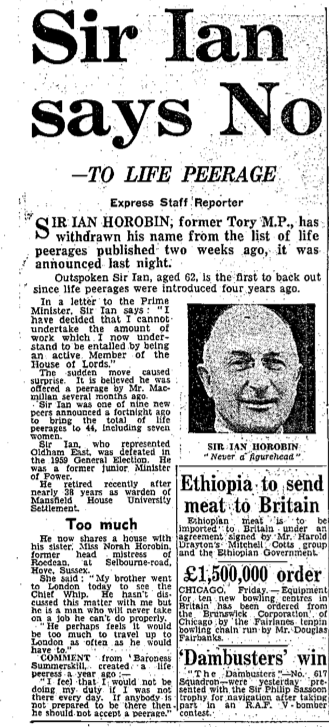
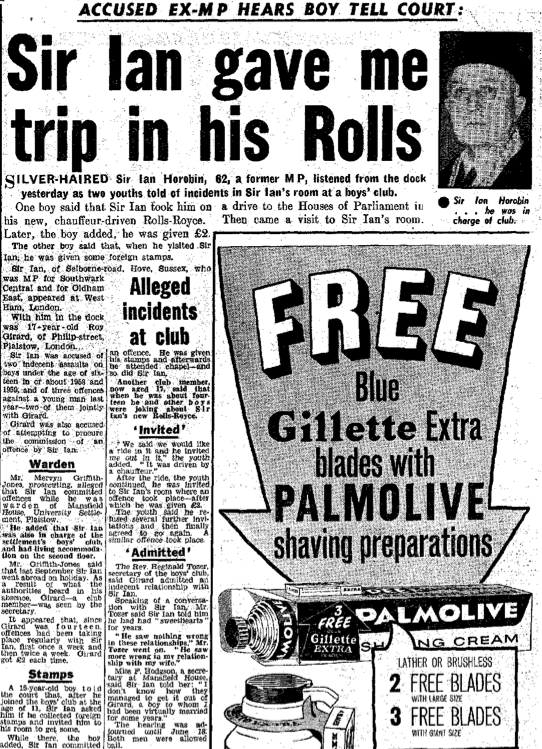
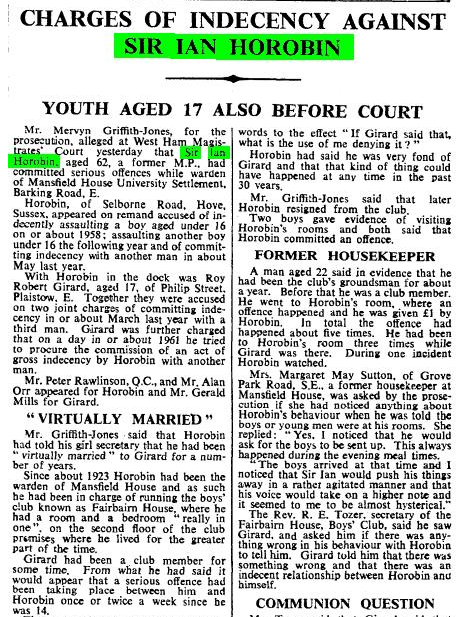
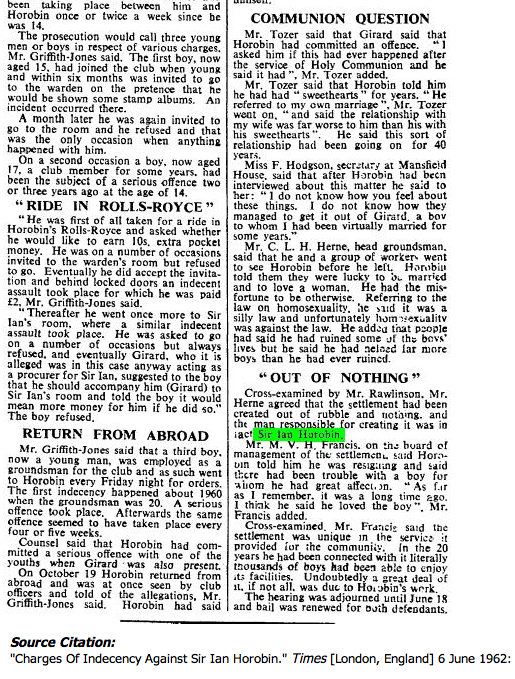
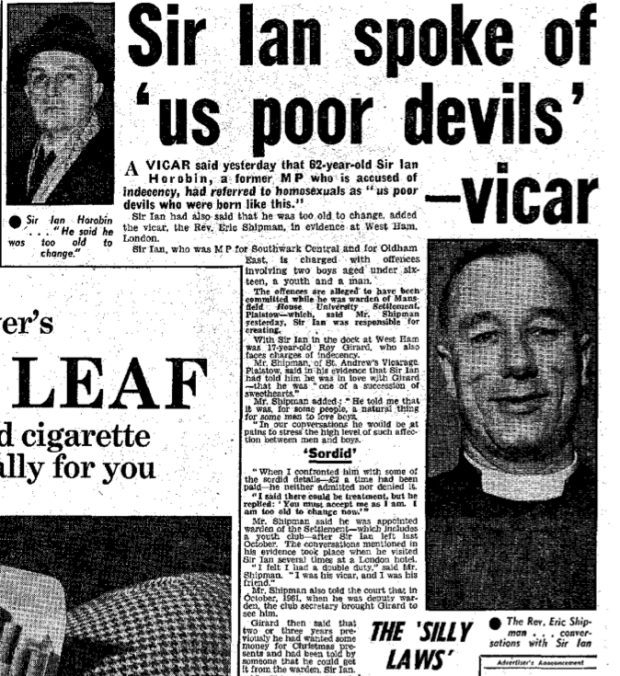
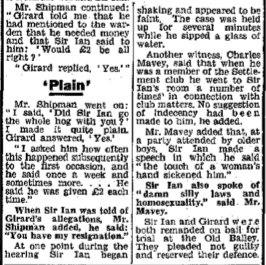
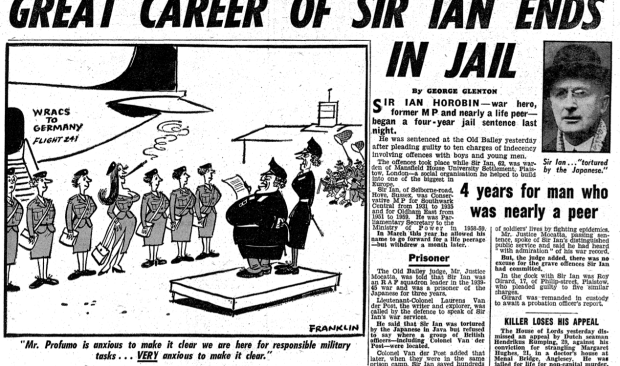
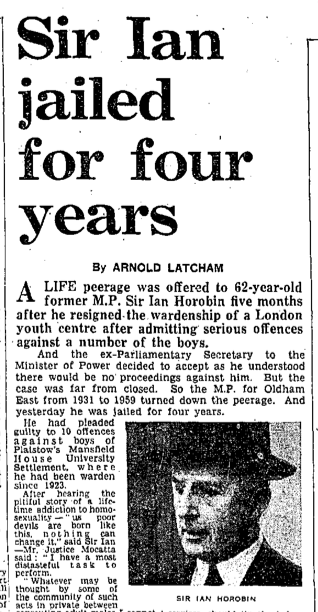
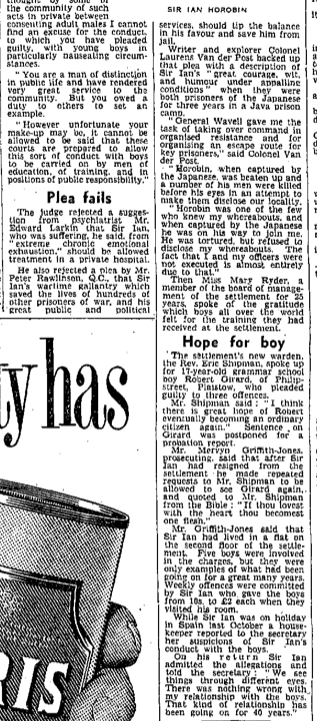
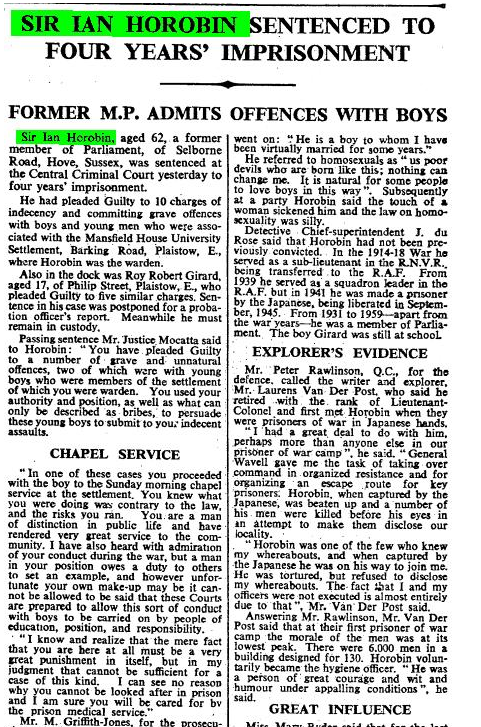
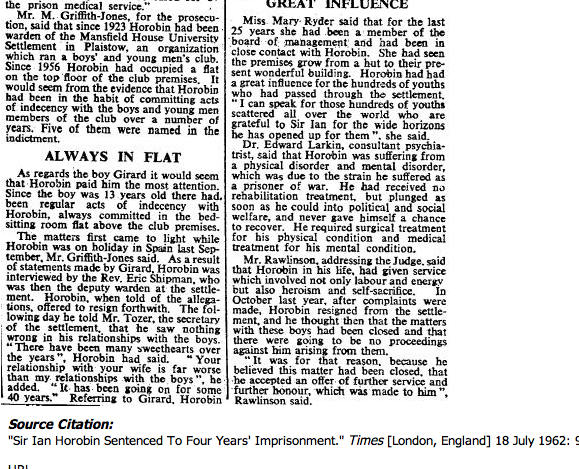
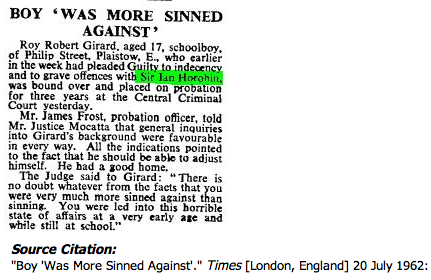

Reblogged this on Desiring Progress and commented:
I cannot recommend strongly enough this new blog article by Charlotte Russell, on the strikingly little-known case of Tory MP Sir Ian Horobin, who received a four year sentence in 1962 for indecent assaults on boys (he had attempted it with the fourteen-year old Terence Stamp, as recounted in Stamp’s autobiography). Then Prime Minister Harold Macmillan’s ‘Night of the Long Knives’ reshuffle in 1962 may bear some resemblance to David Cameron’s reshuffle this week. This post also brings in Lauren van der Post and Lord Reith, against both of whom wider and highly plausible allegations of child sexual abuse exist.
Reblogged this on Zoompad's Blog.